For most upper-level courses, the prerequisite is six credits of second-year English, third-year standing, or by permission of the instructor. See a href="/%3Ca%20href%3D"https://www.viu.ca/courses/english">https://www.viu.ca/courses/english">prerequisites for individual courses.
Fall 2022
| Course | Course Description | Degree Requirement | Professor | |
|---|---|---|---|---|
| 310 | Topics in Rhetoric | Literature and Criticism | Whitehouse | |
| 315 | Advanced Workshop in Composition | Literature and Writing | Torkko | |
| 326 | Topics in Globalization and Culture | Literature and Culture | Smith | |
| 328 | Gender and Sexuality in Literature | Literature and Culture | Grafton | |
| 332 | Topics in Indigenous Literatures | Literature and Culture | Carpentier | |
| 335 | Survey of Canadian Literature | Literature and Culture | Moosa | |
| 342 | Topics in Renaissance Literature | Literature and Traditions, pre-1700 | Crover | |
| 348 | Topics in 18th-Century Literature | Literature and Traditions, 1700-1900 | Doughty | |
| 480 | Research Methods | Literature and Criticism | Lane |
Spring 2023
| Course | Course Description | Degree Requirement | Professor | |
|---|---|---|---|---|
| 314 | Modern Critical Theory | Literature and Criticism | Lane | |
| 325 | Topics in Environmental Literature | Literature and Culture | Atkinson | |
| 329 | Topics in Children's and Young Adult Literature | Literature and Culture | Grafton | |
| 330 | Topics in Speculative Narrative | Literature and Culture | Watkins | |
| 350 | Topics in 19th-Century Literature | Literature and Traditions, 1700-1900 | Hagan | |
| 352 | Topics in 20th-Century Literature | Literature and Culture, post-1900 | Torkko | |
| 390 | Topics in Word and Image | Word and Image | Doughty | |
| 396 | Literature and Film | Word and Image | Ruzesky |
NOTE: Any course descriptions or reading lists here are tentative. Check back for updates.
Course Descriptions: Fall 2022
ENGL 310: Topics in Rhetoric
Professor Ian Whitehouse
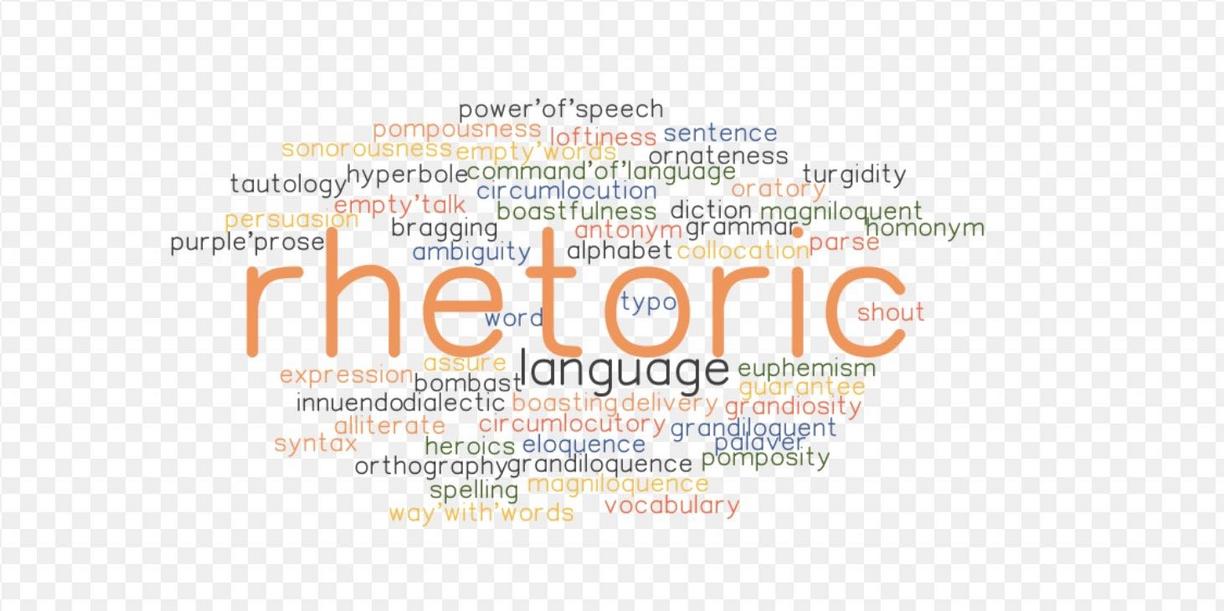
If, as Alfred North Whitehead said, Western philosophy is a footnote to Plato, then Western theories of rhetoric and composition are a footnote to Plato’s greatest student, Aristotle. He systematized, not invented, the techniques and strategies of the orators of his day. His analysis of the three modes of persuasion is still taught in our university composition courses to this day, and his topics, by which everything from a first-year essay to a doctorate can be constructed, are still as functional now as they were then. Furthermore, his analysis of different audiences -- and the way in which they can be persuaded -- has been used by politicians as contemporary as Barack Obama and Donald Trump, and by internet giants such as Facebook and political consulting firms such as Cambridge Analytica, as they profile your interests and construct their advertising and political narratives accordingly. In this course, students will review the beginnings of rhetorical theory, survey its development, learn the contribution of female rhetoricians, and analyze its application in various contemporary discourses from comedy to politics.
ENGL 315: Advanced Workshop in Composition
Professor Deborah Torkko
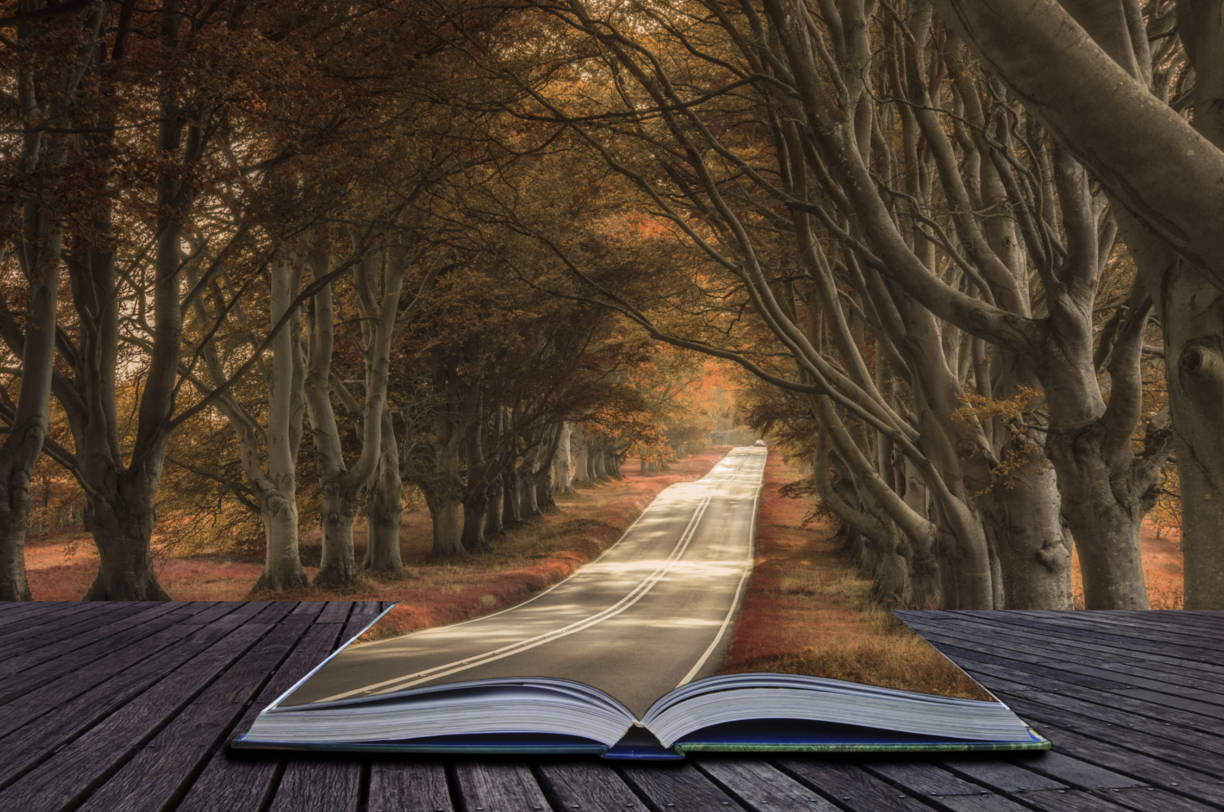
This workshop invites students to develop their capacity to write clear academic prose that is a delight to read and a delight to write. We will explore imaginative and practical ways to stretch the usual conventions associated with traditional forms of academic writing. We will explore the possibilities for how to communicate ideas and argument in a prose style for readers both within and beyond the academic community. We will explore how a writer’s grammatical and stylistic choices create rhetorical effect. In turn, and with attention to language, sentence structure, and essay form, we will develop, shape, and express our thinking in writing that displays a creative and discerning mind at work. In the words of Stephen Pinker, we will remind ourselves of the reasons to strive for good style: to enhance the spreading of ideas, exemplify attention to detail, and to add to the beauty of the world.
ENGL 326: Topics in Globalization and Culture
Professor Toni Smith
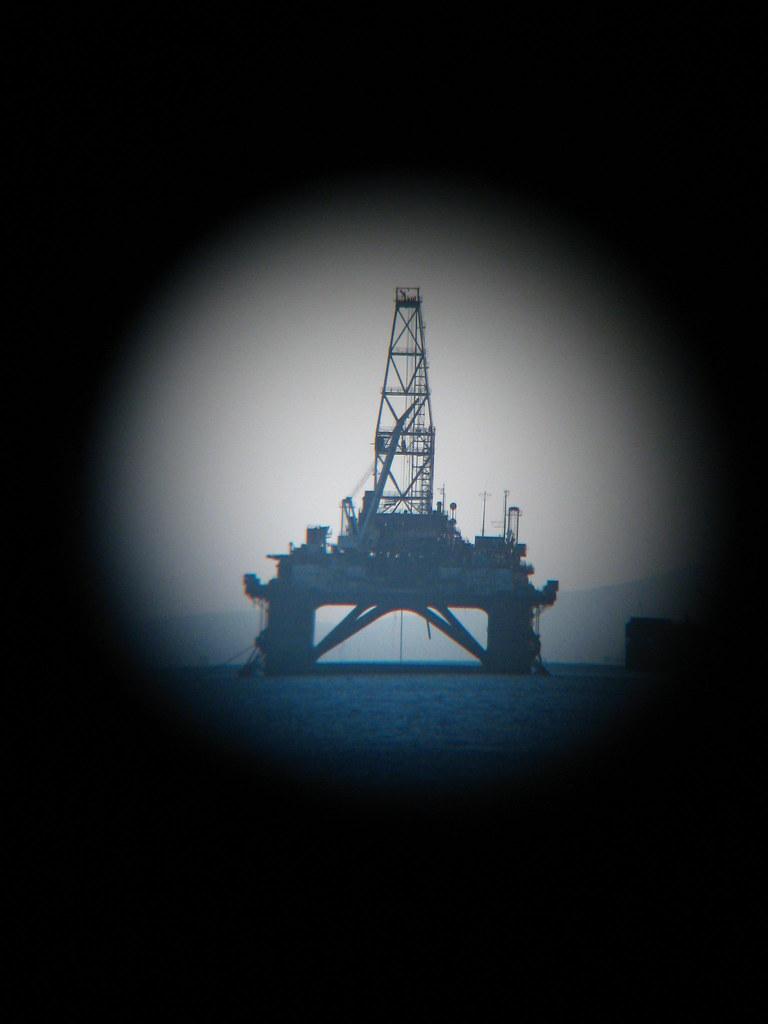
How to transition out of a fossil-fuel driven world economy is a central problem of our time, but the oil industry has been shaping cultures, nations, households, identities, and ecosystems for more than a century. Authors from oil-shaped countries—including our own—have written extensively about the complexity of life in petro-nations, where colonialism, neo-colonialism, capitalism, labour, race, gender, culture, and class all intertwine with conflicts over land and water.
In this course, we’ll read novels and texts by the peoples displaced and re-shaped by the global industry in the Middle East, Africa, the US, and Canada. Join us to learn more about the complex issues at stake in the development of oil and gas pipelines for indigenous people and others in BC, Alberta, and beyond.
ENGL 328: Gender and Sexuality in Literature
Professor Janet Grafton
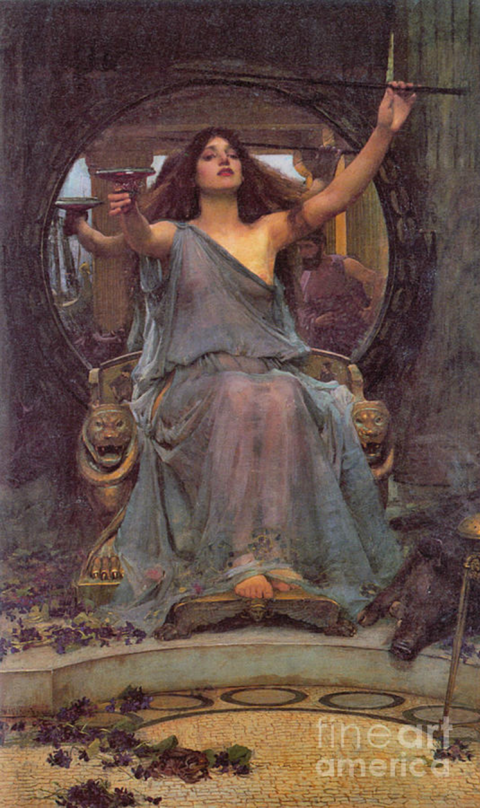
This course will investigate the witch trope in literature and trace the development and application of this trope from Greek mythology and folk tales to contemporary representations. Through readings and seminar discussions, we will look at how the label “witch” has been applied in literature across cultures and eras and how it has evolved, from the age of witch-hunts to modern-day politics to the feminist reclamation of the term as a slur. We will also look at who the term has historically been applied to, and how the hegemonic use of the term has been used to condemn and control sexuality, knowledge, and deviance from the norm. The witch as signifier of power, difference, and the untamed makes it a powerful trope, and we will unpack the discomforts and fears attendant with this trope, as well as the language associated with it, including crone and hag - language that reveals larger social anxieties around gender, age, and power. Course readings and materials will include a range of genres, such as feminist criticism, short stories, poetry, global folk tales, myths, popular culture, film, and television.
ENGL 332: Topics in Indigenous Literatures
Professor Sally Carpentier
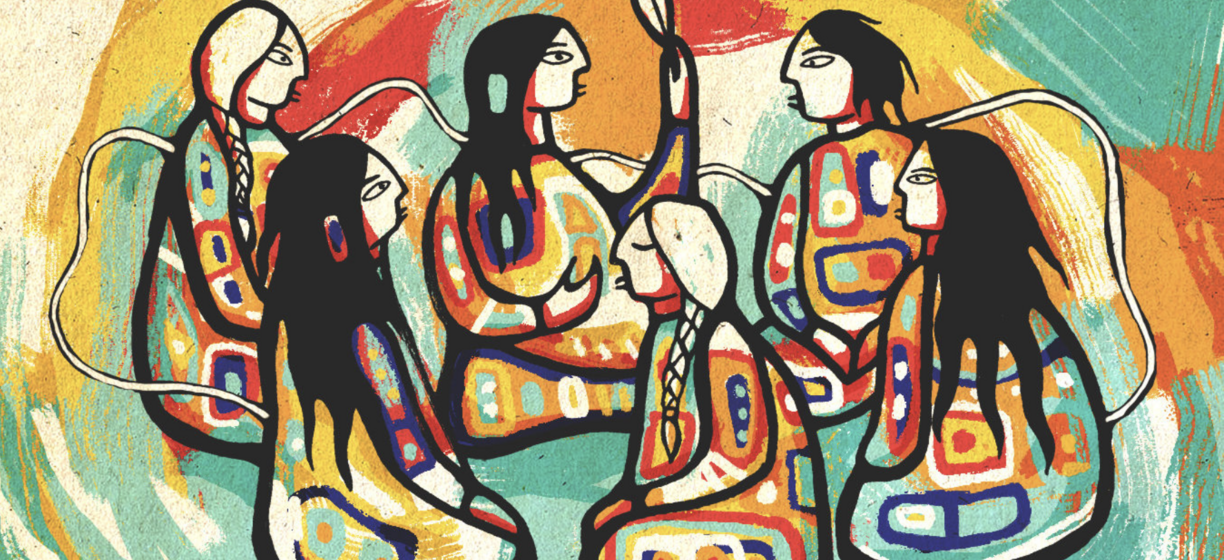
Through the exploration of various works, ENGL 332 will begin by examining some of the more problematic terminologies that define Indigenousness. We will then move into discussing how stories figure significantly for Indigenous peoples, their lands, identities, and traditions, and how the colonial discourse restricts our understanding of the complexities of Indigenous Literature. By reviewing the history and cultural practices of these various peoples, we will begin to gain a more comprehensive understanding of the contemporary issues that they face in today’s world. ENGL 332 will also investigate the pre/post contact theories, contemporary issues, historical relevancies, cultural practices, and a general appreciation for Indigenous Literature from a variety of readings.
ENGL 335: Survey of Canadian Literature
Professor Farah Moosa

In this course, we will read a range of significant works in Canadian literary culture from the mid-nineteenth century to the present. Paying close attention to the historical and cultural contexts in which our texts were produced, we will discuss issues of colonization, settlement, literature and national identification, multiculturalism, and diaspora. We will also consider how specifically Canadian contexts of literary production (e.g. publication, government policy) have influenced the field of CanLit.
Readings may include excerpts from Susanna Moodie’s Roughing It in the Bush (an account of the archetypal pioneer’s first seven years in Canada), writer and performer E. Pauline Johnson (Tekahionwake)’s poetry, and Armand Garnet Ruffo’s contemporary response to Duncan Campbell Scott. Other works may include Margaret Laurence’s novel The Fire-Dwellers and Dionne Brand’s novel What We All Long For.
ENGL 342: Topics in Renaissance Literature
Professor Sarah Crover
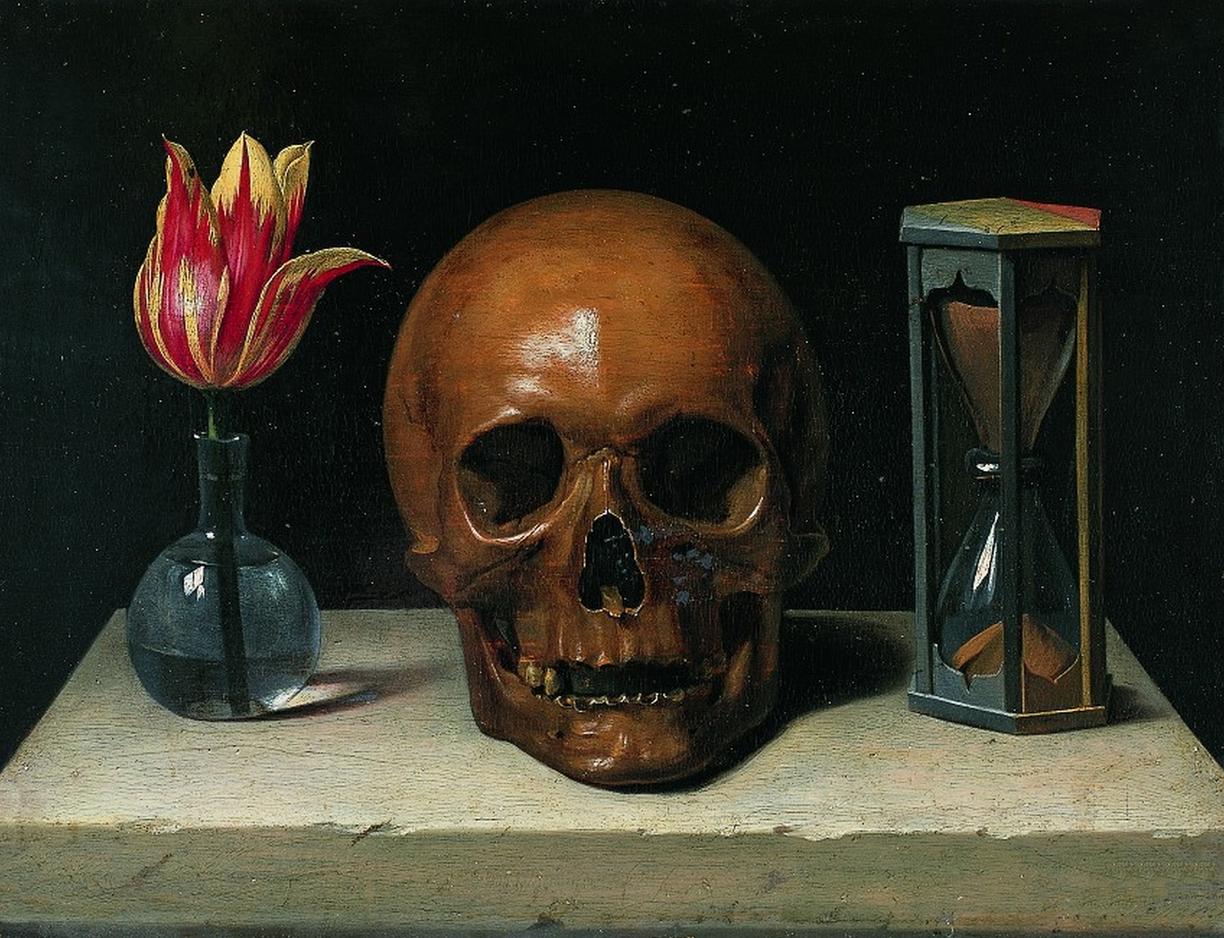
1550 to 1660 in England, or the period known as the English Renaissance, was an age of radical upheaval. Exploration of the Americas; the emerging protestant faith; new technologies and the resultant reconfiguration of both urban and natural environments; and the rise of the scientific method were sweeping away the world as it had been, and leaving uncertain possible realities in its wake. In this course, we will consider texts that foreground conversions – of bodies, of minds/souls, of space – and the questions these conversions raise about identity and the nature and staying power of transformation. In the course of our study, we will consider questions such as what was the relationship between art and transformation? How did theories of race or gender shape perceptions about the likelihood of a “true” conversion? How did rapidly obsolescing theories of alchemical transformation continue to inflect later Renaissance scientific and philosophical thought? Did converted spaces (reclaimed riverbanks, drained fens) retain elements of their former character? Possible texts may include selections from Sidney’s A Defence of Posesie, Lanyer’s Salve Deus Rex Judaeorum, Bacon’s Novum Organum Scientiarum, Herbert’s Psalms, Spenser’s Faerie Queene, and More’s Utopia, as well as Shakespeare’s Merchant of Venice, Marlowe’s Doctor Faustus, and selected books from Milton’s Paradise Lost.
ENGL 348: Topics in 18th-Century Literature
From to Sensibility to Sensation: Affect and the Novel
Professor Terri Doughty
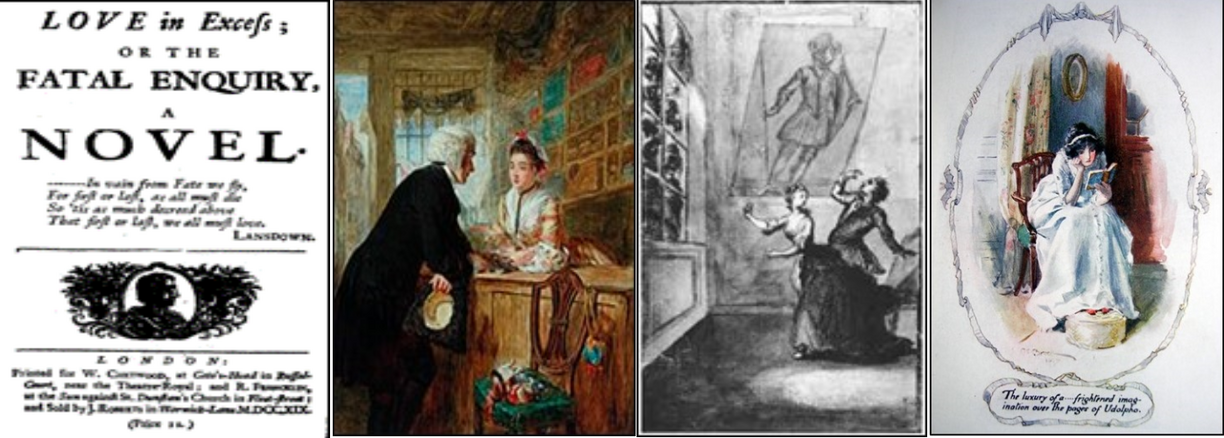
This course is delivered in blended asynchronous format. Students may participate entirely in person, entirely online, or in a combination of the two.
The novel, as its name suggests, was a new genre emerging in the eighteenth century (yes, there are arguments for earlier long prose narratives, but generally the eighteenth-century is the site of the development of the genre). As a new genre, the novel did not have a set of accepted formal requirements, so there’s a great deal of experimentation. Its newness also created spaces for more women to enter the literary marketplace. Some of the anxiety about the novel was focused on the genre’s affective impact, raising questions about romance, sensibility, sentimentality, and sensation. We will explore five shorter novels that span the century, focusing on questions of genre, emotion, and gender.
The following Broadview Press editions will be available through the Campus Store:
- Eliza Haywood, Love in Excess, 2nd ed., ed. David Oakleaf, 2000 [orig. pub. 1719]
- Laurence Sterne, A Sentimental Journey through France and Italy, ed. Katherine Turner, 2010 [orig. pub. 1768]
- Horace Walpole, The Castle of Otranto and The Mysterious Mother, ed. Frederick S. Frank, 2003 [we will read only The Castle of Otranto, orig. pub. 1764]
- Charlotte Dacre, Zofloya, or the Moor, ed. Adriana Craciun, 1997 [orig. pub. 1806]
- Jane Austen, Northanger Abbey, 2nd ed., ed. Claire Grogan, 2002 [orig. pub. 1817; written before 1803].
ENGL 480: Research Methods
Professor Richard Lane
An opportunity to enhance research skills, explore a variety of literary critical approaches and their theoretical foundations, and consider the impact of digital technologies on our discipline. May include proposal writing, rhetorical issues, varieties of collaboration, information literacy, and scholarly communication.
Course Descriptions: Spring 2023
ENGL 314: Modern Critical Theory
Professor Richard Lane
A survey of literary theory including Russian Formalism, Structuralism, New Criticism, Marxism, Feminism, Post-Colonialism, Post-Structuralism, and others. Each theory may be examined for its assumptions, applications, and textual strategies. This course will introduce the tools of criticism and a wide range of critical dispositions.
ENGL 325: Topics in Environmental Literature
Professor Anna Atkinson
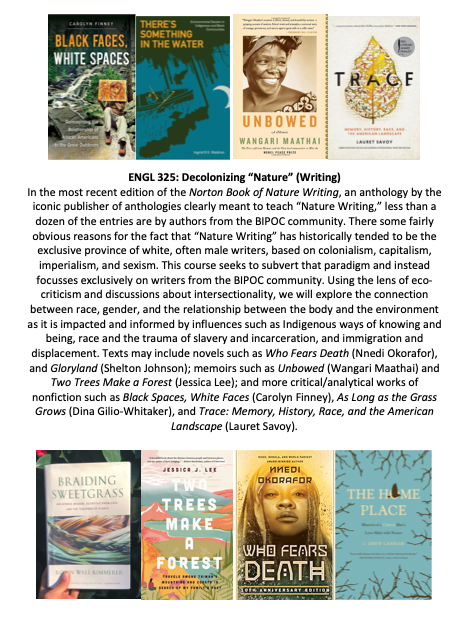
ENGL 329: Topics in Children's and Young Adult Literature
Professor Janet Grafton
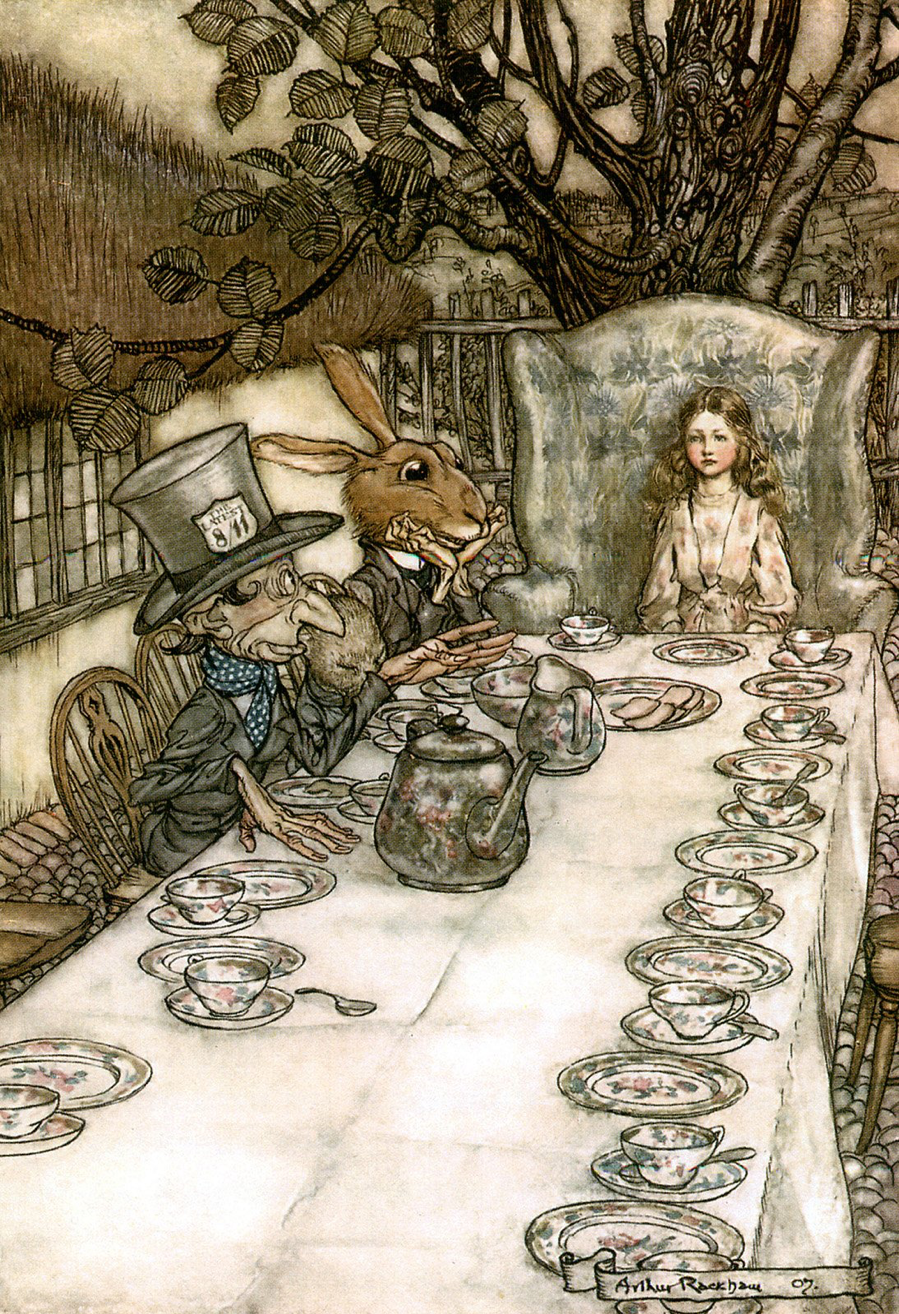
Food is an enduring theme in children’s and young adult literature, from the feasts in Harry Potter and The Hobbit to the elaborate tea parties in Anne of Green Gables and Alice’s Adventure in Wonderland, from the stories of traditional food gathering in The Birchbark House to the complex post-apocalyptic depictions of food in The Hunger Games and Feed. In looking at classic children’s texts such as The Secret Garden and Pippi Longstocking through the lens of ‘real’ food and ‘fantastical’ food, we’ll be investigating what these texts can offer contemporary audiences in the midst of environmental crisis. As well, we’ll be examining the pedagogical challenges of texts from the past and asking what role they have in today’s homes, libraries, and classrooms.
ENGL 330: Topics in Speculative Narrative
Professor Paul Watkins
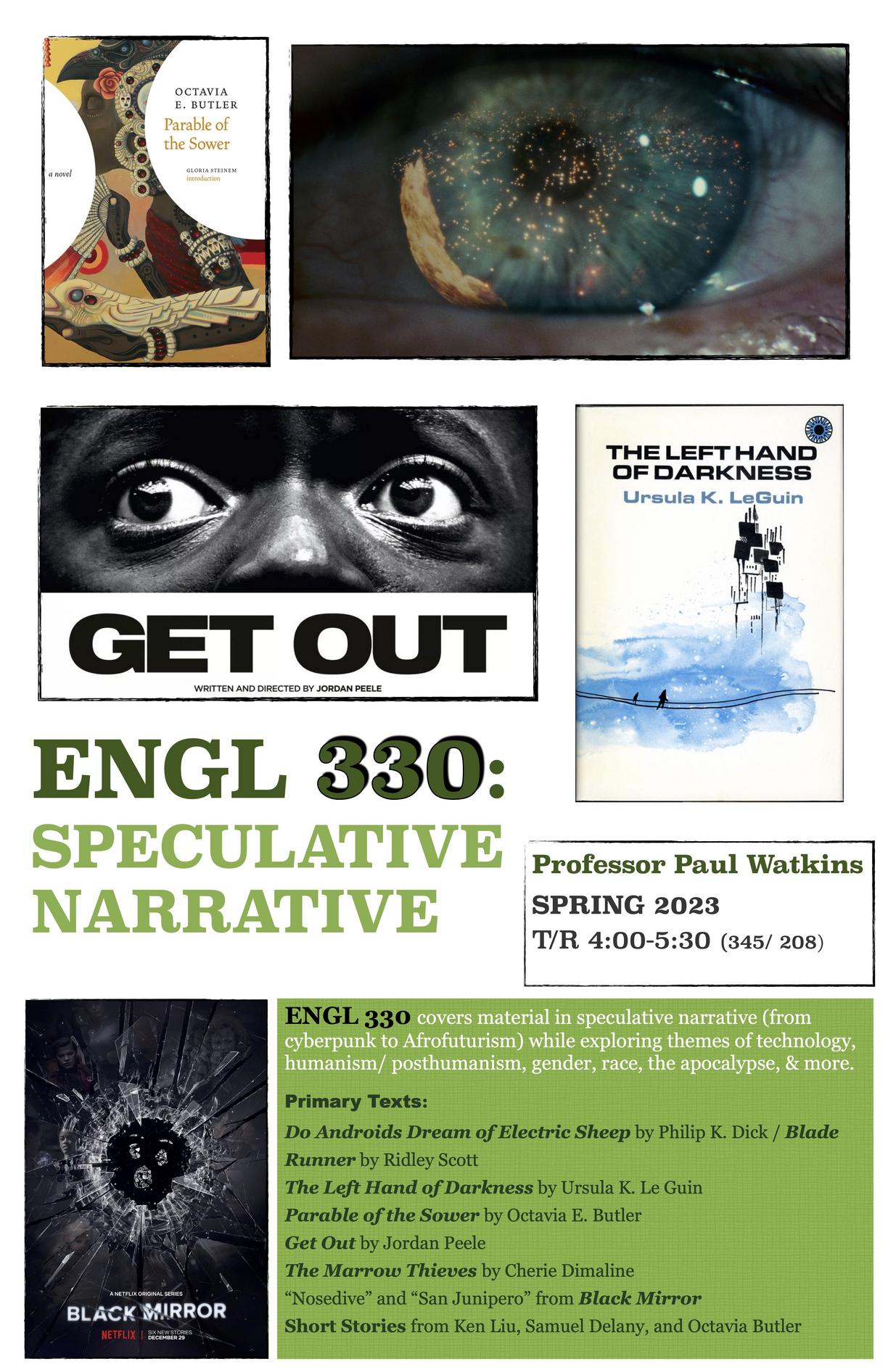
ENGL 350: Topics in 19th-Century Literature
Professor Sandra Hagan
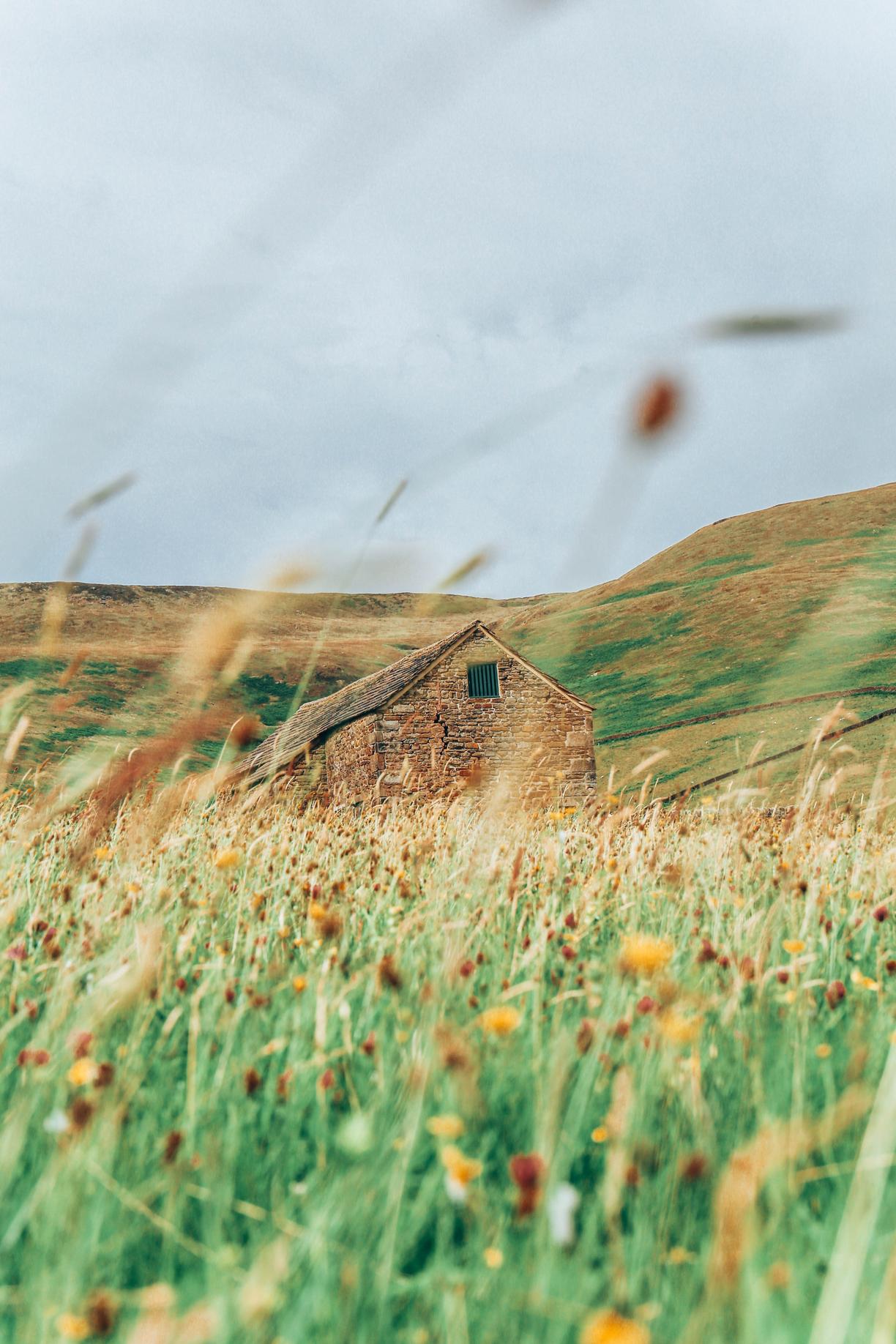
Images of fog-bound cityscapes are often invoked when contemporary readers hear the phrase the Victorian novel. Indeed Victorian readers themselves, in a newly urban and industrialized England, found themselves removed from rural reality. For urban dwellers, where London’s Crystal Palace exhibition saw the nation vaunting its industrial progress to the world and city fogs were some part weather and many parts pollution, rural tales offered a nostalgic escape to a simpler, more wholesome life. Thus when novels about country life appeared, readers warmly embraced picturesque renderings such as George Eliot’s Adam Bede and dismissed as grotesque more revealing depictions like Emily Brontë’s Wuthering Heights. In this course, we’ll explore a range of Victorian representations of rural life, from the raw to the rosy and the sensational to the sombre. You’ll find there’s more to the Victorian countryside than milk maids and stable boys. Texts may include selections like Adam Bede, Wuthering Heights, Lady Audley’s Secret, and the graphic narrative Tamara Drewe.
ENGL 352: Topics in 20th-Century Literature
Professor Deborah Torkko
A study of 20th-century literature within the broader social, political, philosophical, and cultural contexts of the age. Topics may include Modernism, Post-Modernism, the Harlem Renaissance, 1960s activist literature, and others. Focus may be on a specific author, genre, or literary movement, with texts primarily from outside of Canada.
ENGL 390: Topics in Word and Image
Professor Terri Doughty
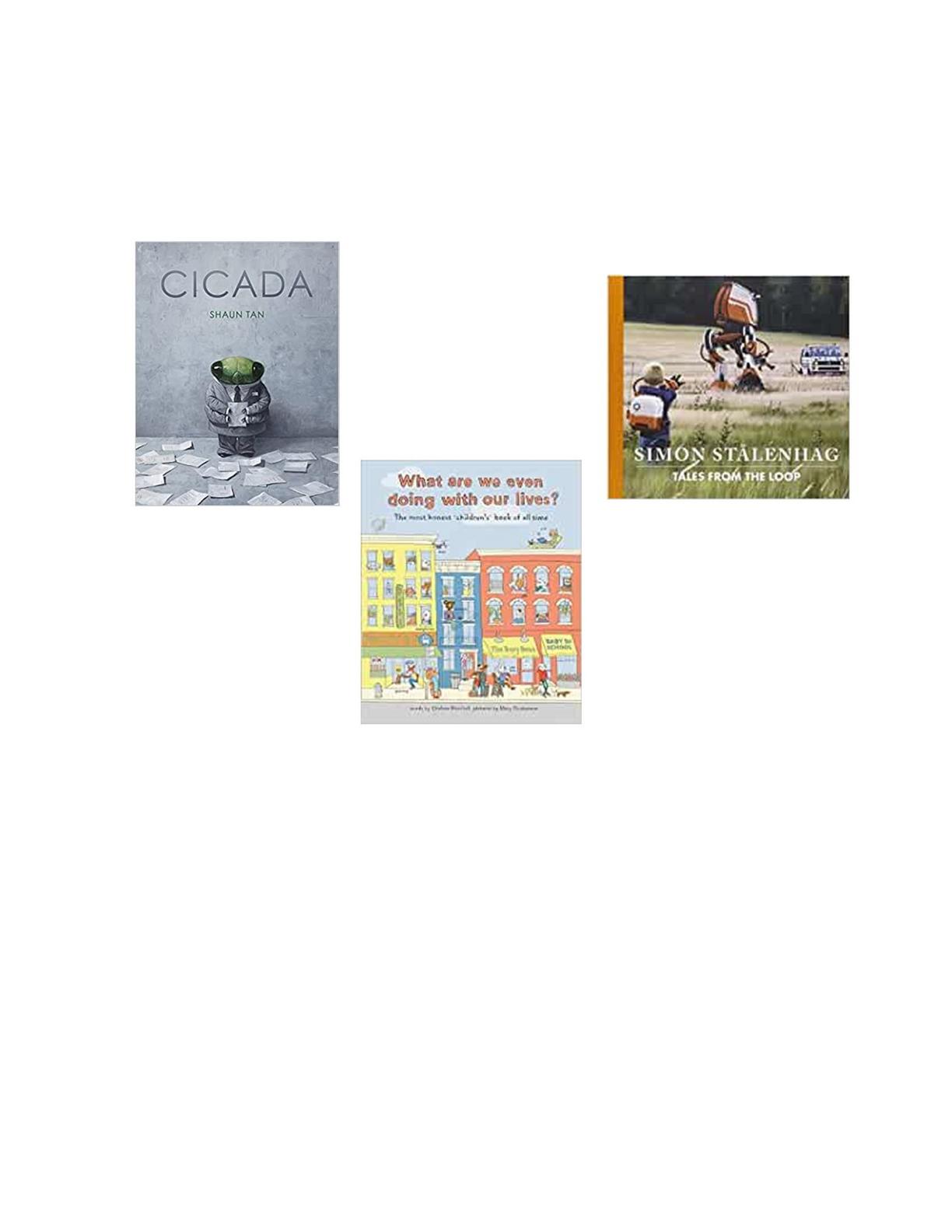
Alice, at the opening of Alice's Adventures in Wonderland, may ask "What is the use of a book … without pictures?" However, there is a tendency to view books with pictures as juvenile and unsophisticated. This is quite incorrect. Texts that require decoding of words, images, and the interactions between the two are incredibly sophisticated. In this course, we'll explore the liminal space of crossover books: picturebooks for children that appeal to adults, picturebooks for adults (including ones that might appeal to youth), graphic narratives for youth that appeal to adults, and graphic narratives for adults that appeal to youth. Discussions will address theoretical frames for reading books with words and pictures and questions about intersections of audience and subject matter. Creators we'll study may include Shaun Tan, Armin Greder, Kyo Maclear, Elena Ferrante, Nora Krug, Rutu Modan, Peter Sís, and Simon Stålenhag.
ENGL 396: Literature and Film
Professor Jay Ruzesky
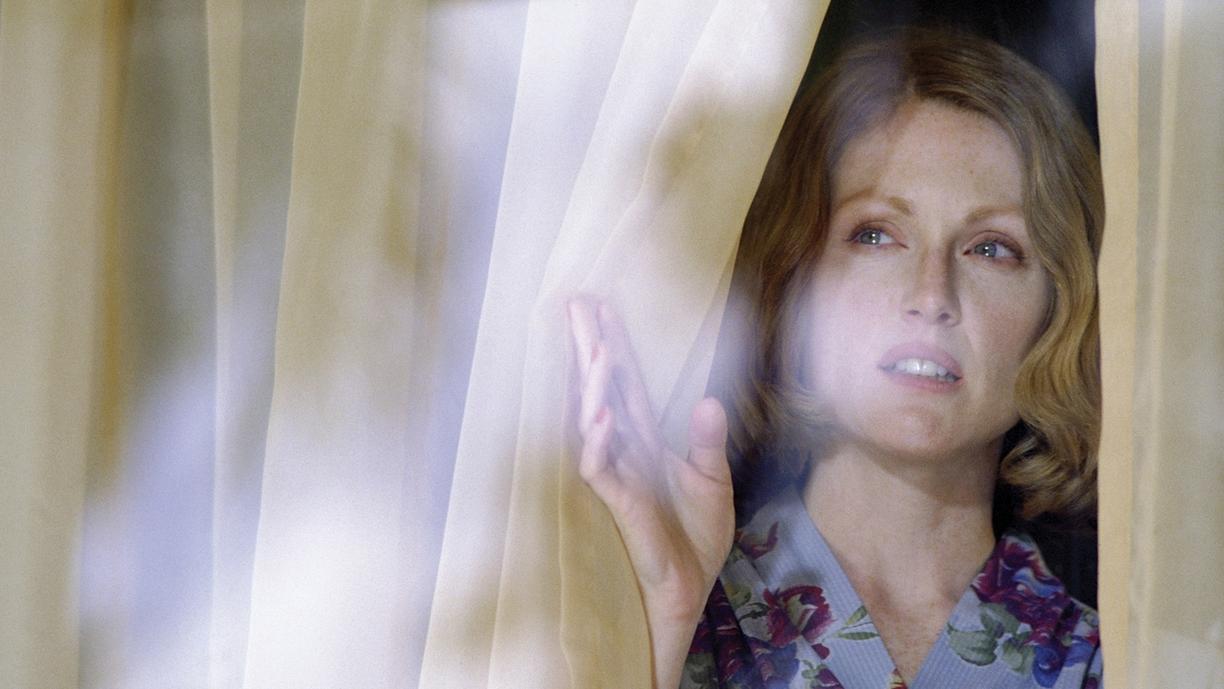
This section of ENGL 396: Film and Literature is a study of adaptations. We will look at stories and poems conceived for the page and later brought to the screen, and we will compare the way different media treat similar subjects. Through a close examination of the techniques of literature and the techniques of filmmaking, we will examine the magical way that one story becomes two.
Generic course descriptions for all English courses are in the VIU Program and Course Calendar.
